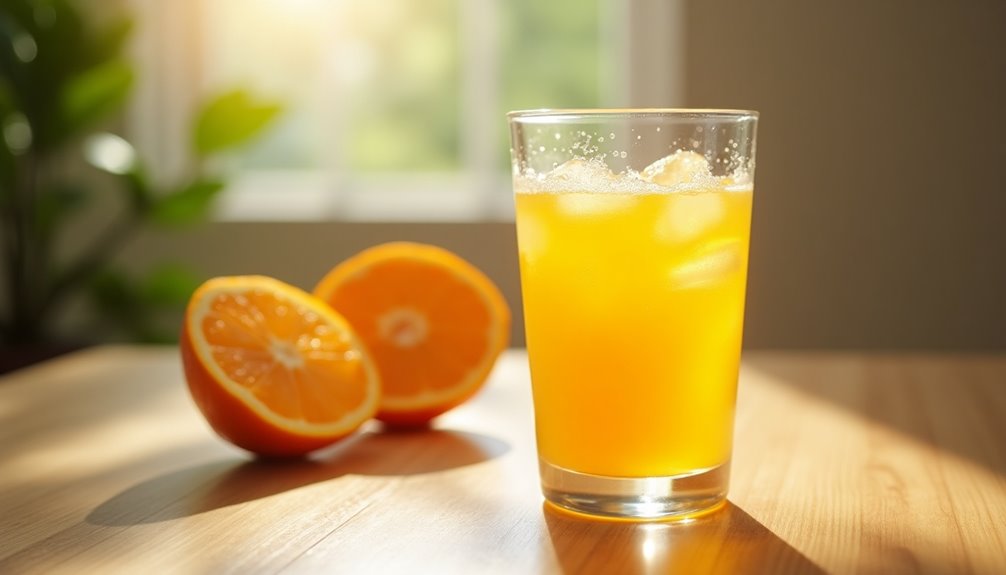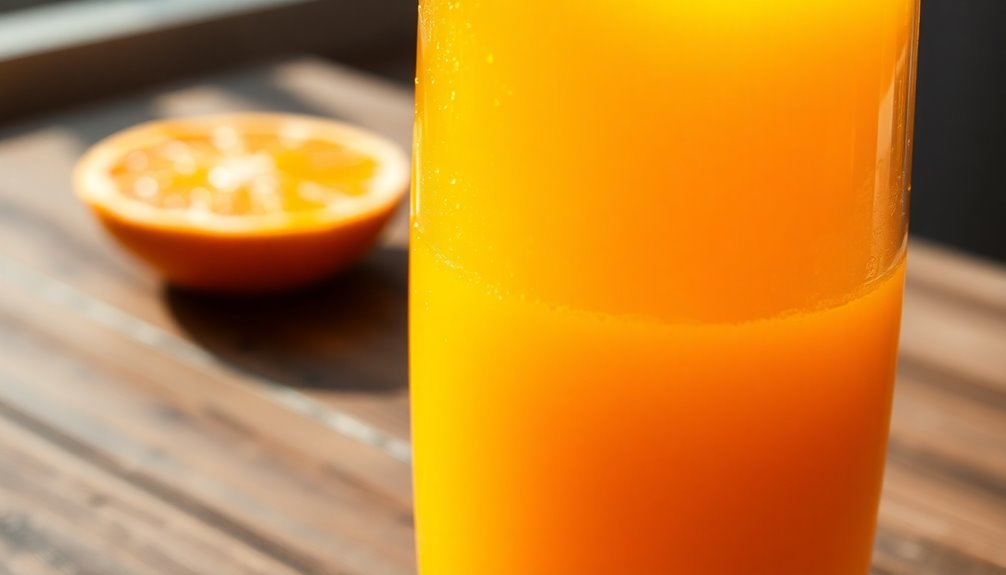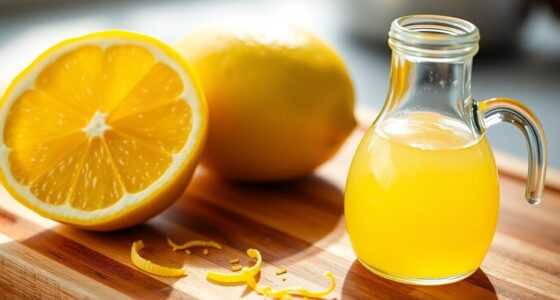An 8-ounce glass of orange juice contains about 496 mg of potassium, which makes up roughly 10% of the daily recommended value for adults. This nutrient is essential for muscle function, nerve transmission, and maintaining fluid balance in your body. Plus, orange juice can be a convenient way to boost your potassium intake if you're not getting enough from whole fruits. Want to know more about the benefits of potassium and orange juice? Keep exploring!
Key Takeaways
- An 8-ounce glass of orange juice contains approximately 496 mg of potassium.
- This amount represents about 10% of the recommended daily value for adults.
- Potassium in orange juice supports nerve transmission and muscle contraction.
- Regular intake can help maintain healthy blood pressure levels.
- Orange juice serves as a convenient source of potassium for those lacking whole fruits.

Have you ever wondered how much potassium is in a glass of orange juice? If you’ve got an 8-ounce glass of this delicious drink, you’re looking at approximately 496 mg of potassium. That’s about 10% of the recommended daily value for adults. You mightn’t realize it, but that glass of orange juice is more than just a refreshing beverage; it’s a convenient source of vital nutrients that can support your overall health. In addition to potassium, orange juice is rich in vitamin C and folate, both of which play crucial roles in maintaining a healthy immune system and supporting cellular function. Many people often overlook the nutritional benefits of their favorite beverages, but understanding how much potassium is in orange juice can help you make informed dietary choices. Incorporating a glass into your breakfast routine not only delights your taste buds but also contributes to your daily nutrient intake.
Potassium plays a crucial role in your body, contributing to several essential functions. For instance, it aids in nerve transmission and muscle contraction, which means it's vital for muscle function. This is particularly important for athletes or anyone who engages in regular physical activity.
By enjoying a glass of orange juice, you're not just quenching your thirst; you're also fueling your body with a nutrient that helps maintain fluid balance and supports the immune system. That's a win-win!
You might be wondering how orange juice stacks up against whole fruits in terms of nutritional value. While whole fruits are often praised for their fiber content and overall health benefits, orange juice can still play a significant role in your diet. If you find it challenging to consume enough whole fruits, incorporating orange juice can help bridge that gap.
It's an easy and tasty way to increase your potassium intake, especially when you're on the go.
Moreover, if you're concerned about high blood pressure, consider that potassium is known to help regulate blood pressure levels. Regularly consuming potassium-rich foods, like orange juice, can assist in maintaining healthy blood pressure, which is essential for long-term health.
So, if you're looking to support your cardiovascular system, a glass of this citrusy drink may be a great addition to your routine.
When you think about vitamins, you might primarily think of vitamin C, which is abundant in orange juice. However, it's worth noting that potassium is just as important for your overall health.
The balance of electrolytes in your body—potassium being a key player—affects everything from hydration to muscle function. So, sipping on orange juice not only gives you a refreshing taste but also delivers important vitamins and minerals your body needs.
Frequently Asked Questions
How Much Potassium Is in an 8 Oz Glass of Orange Juice?
When you think about potassium sources, orange juice might come to mind. An 8-ounce glass of this refreshing drink packs around 496 mg of potassium, providing about 10% of your daily needs.
It's a great way to boost your potassium intake, supporting nerve function and fluid balance in your body. Plus, it's loaded with vitamin C and antioxidants.
Just remember, whole oranges offer more fiber, making them a healthy option too!
How to Get 4700 Mg of Potassium per Day?
To get 4,700 mg of potassium daily, you'll want to include a variety of potassium-rich foods in your diet.
Start with bananas, sweet potatoes, and spinach, then add legumes like lentils and avocados.
Incorporating multiple servings of fruits and vegetables throughout the day will help you reach your goal.
Using a nutrition app can also make tracking your intake easier, ensuring you meet your potassium needs without much hassle.
Which Has More Potassium, a Banana or a Glass of Orange Juice?
When it comes to potassium, think of bananas and orange juice as friendly rivals in a nutrient showdown.
A medium banana packs about 451 mg of potassium, while an 8-ounce glass of orange juice boasts around 496 mg.
So, if you're aiming for that potassium boost, orange juice takes the lead by a smidge.
Both choices are excellent, but orange juice edges ahead in potassium content, making it a refreshing pick!
Is Orange Juice High in Potassium?
Yes, orange juice is high in potassium. When you drink it, you're not just enjoying a tasty beverage; you're also boosting your potassium intake.
This mineral is essential for maintaining electrolyte balance and supporting your bodily functions. With about 450 mg of potassium in an 8-ounce serving, it contributes significantly to your daily needs.
Incorporating orange juice into your diet can help you easily reach your potassium goals, especially alongside other fruits and veggies.
Conclusion
So, you might be wondering if orange juice is worth it given its sugar content. But here's the thing: the potassium in a glass of orange juice—about 500 mg—can help balance out those sugars and support heart health. Plus, it's a delicious way to hydrate and fuel your body. So don't hesitate to pour yourself a glass! Enjoy the benefits while savoring the refreshing taste. Your body will thank you for it!
Cindy thoroughly researches juicing trends, techniques, and recipes to provide readers with practical advice and inspiration. Her writing style is accessible, engaging, and designed to make complex concepts easy to understand. Cindy’s dedication to promoting the advantages of juicing shines through her work, empowering readers to make positive changes in their lives through the simple act of juicing.











